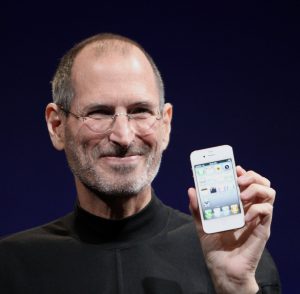Innovation Decision Makers – the genius or the customer?
 Steve Jobs was a genius. He transformed his industry through innovation, making the right call at the right time for the right technology in the right product. Famously, he avoided asking customers what they wanted, because they wouldn’t understand it and it would waste time.
Steve Jobs was a genius. He transformed his industry through innovation, making the right call at the right time for the right technology in the right product. Famously, he avoided asking customers what they wanted, because they wouldn’t understand it and it would waste time.
Steve Jobs was rare. There are very few situations where normal companies can take the approach of avoiding the customer’s views. In most markets, customer insights can lead to inspiration for innovation; subsequent testing and validation optimises the offering and increases the chance of success. The customer provides the data on which the decision is made.
Decision points are crucial times in the development of new products and technologies, whether they are made by the CEO or further down the organisation by teams or individuals. They determine the ambition, the target, the next steps. They set the tone for risk and tolerance of failure.  They concern everything from strategic portfolio development to the colour of the icon in the top left hand corner.
The visionaries like Steve Jobs get it right. Many other very talented people also know when and how to make the right calls. It’s tougher in explorative areas, where there is a higher level of risk and uncertainty. It’s more appropriate for “genius†decisions to be made in these projects, primarily because potential customers will be less familiar with the proposition.
Having said that, it isn’t exactly straightforward in the exploitative parts of organisations, where existing customers are already familiar with the company’s current offering and are in a good position to judge future improvements. Much work can be done with customers, but many decisions need to be made without them. Often there isn’t time to check the customer view. Also the decision may not be so pivotal. This is where the smart people use good judgment to determine what to ask and when, if at all.
I’ve been in many situations where senior people make observations and subsequent decisions that turn out to be right. It’s because they’re smart, perceptive and experienced. The best ones are open to challenge, with an important caveat – convince me with data. Occasionally, though, the hubris of authority can convince some leaders that they are the sole arbiters of wisdom.
I heard an illuminating story on this issue recently. A small supplier to a large retailer was presenting the new range of innovative food products for a Christmas range launch to the senior buyer for the category, in an open office. Halfway through the meeting, the Head of Buying walked past and joined the meeting. She insisted on tasting some of the products. “They’re too sweet. I don’t think they’re good enoughâ€. Then walked away. A subsequent discussion didn’t change her mind.
Forget the validation with experts. Forget all the consumer work. Forget the extensive development work including stability and scale up. The senior buyer was placed in an impossible position; she couldn’t proceed without at least some change to the range which then had to be presented to the boss. The innovation supplier had to make those changes in record time.
The Head of Buying may have been the Steve Jobs of her business, with one crucial difference. Personal taste is very much that. It’s one area where the views of consumers must prevail; each individual has the same buying potential, whether expert or naïve.
Awareness is key, both of self and situation. Not everybody has the talent to make the call. Not every business should let the genius decide. And not every situation within that business needs that individual decision. We aren’t all like Steve Jobs.
image credit: wikimedia commons

Wait! Before you go…
Choose how you want the latest innovation content delivered to you:
- Daily — RSS Feed — Email — Twitter — Facebook — Linkedin Today
- Weekly — Email Newsletter — Free Magazine — Linkedin Group
 Kevin McFarthing runs the Innovation Fixer consultancy, helping companies to improve the output and efficiency of their innovation, and to implement Open Innovation. He spent 17 years with Reckitt Benckiser in innovation leadership positions and also has experience in life sciences. Follow @InnovationFixer
Kevin McFarthing runs the Innovation Fixer consultancy, helping companies to improve the output and efficiency of their innovation, and to implement Open Innovation. He spent 17 years with Reckitt Benckiser in innovation leadership positions and also has experience in life sciences. Follow @InnovationFixer
NEVER MISS ANOTHER NEWSLETTER!
LATEST BLOGS
Three things you didn’t know about credit cards
Photo by Ales Nesetril on Unsplash Many of us use credit cards regularly. From using them for everyday purchases to…
Read MoreFive CV skills of a business-minded individual
Photo by Scott Graham on Unsplash The skills listed on a CV help employers quickly understand your suitability for a…
Read More

